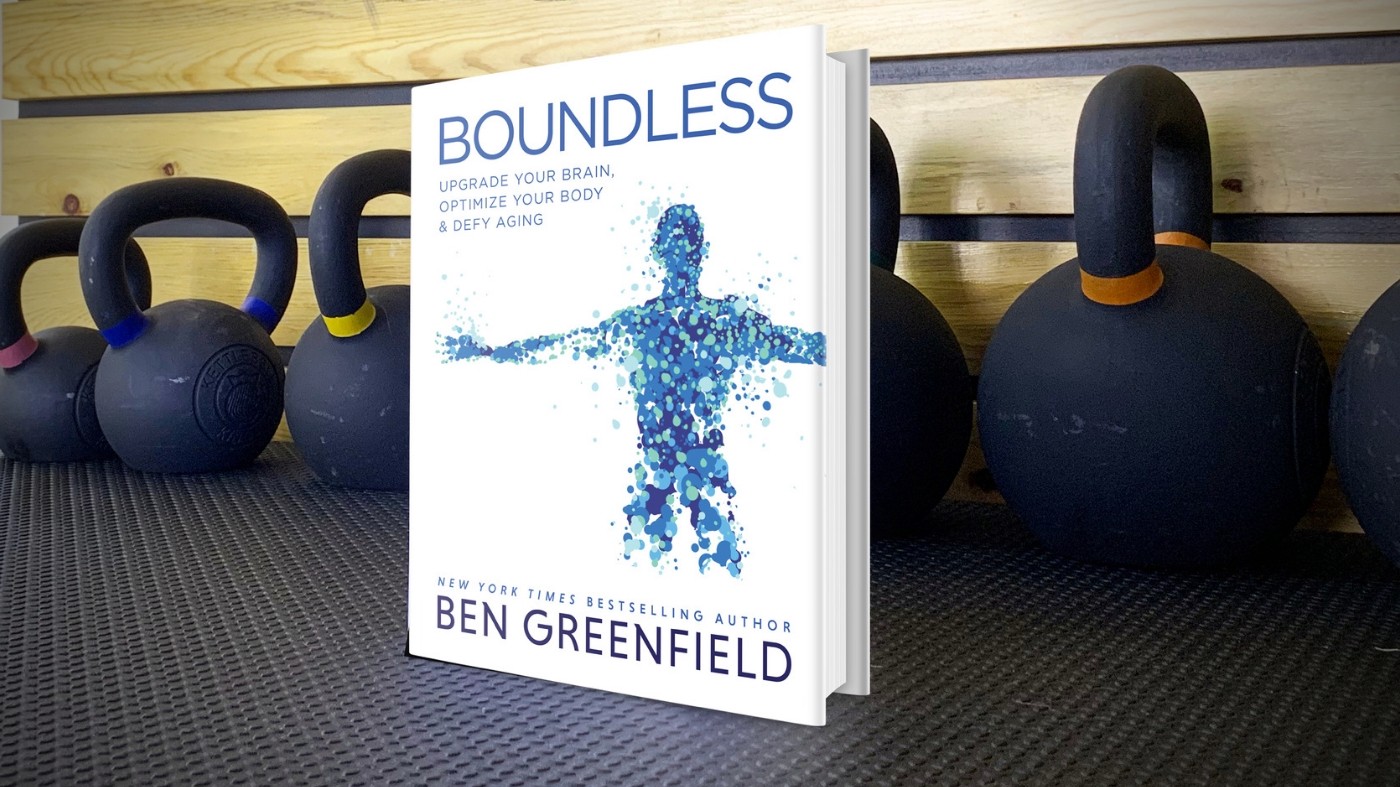
I went to the LA launch party for BOUNDLESS, the new book by Ben Greenfield. He’s known as a leading biohacker, personal trainer and podcast host who covers the latest research on health and human performance.
Greenfield combines data from clinical studies with ancestral wisdom to deliver specific, actionable recommendations — on diet, supplementation, exercise, training, sleep, lifestyle, and aging.
Here are my biggest takeaways.
Charge Your Body Like a Battery
Mitochondria, the power plants in our cells that create energy, are like tiny electrochemical factories. You can support mitochondrial health by charging your human battery with light, earthing, heat, cold, water and minerals — things that help transport electrons where your body needs them.
Be out in sunlight frequently. There’s a concept called “human photosynthesis” that suggests our ability to create energy (ATP) depends on exposure to photons of light.
Be outside barefoot, touching the ground, every day. This practice, known as “earthing” or “grounding,” has been shown to decrease inflammation and improve overall health.
Introduce heat and cold into your body. Finnish longevity studies show sweating or being hot on a frequent basis is very good for the body. Cold thermogenesis / cryotherapy / cold showers are great for weight stability and blood flow.
Hack Your Sleep
Sleep has emerged as one of the most important areas of health. More people are using sleep tracking systems like SleepCycle or Oura Ring to measure their sleep quality. Poor sleep is linked to poor health — inflammation, obesity, and neurological disorders.

Greenfield’s tips for a better night’s sleep:
Light: Use red incandescent light bulbs in bedroom & bathroom. Exposure to blue light at bedtime interferes with your body’s melatonin production and negatively affects sleep quality. Use an app like f.lux or Iris to auto-optimize your screen’s colors/brightness and minimize blue light exposure at night.
Hot/cold exposure: Take a hot and cold shower before bed — 20 seconds cold, 10 seconds hot, alternating 10 times through. The temperature exposure produces nitric oxide, stimulates the vagus nerve, and reduces inflammation.
Temperature control: Sleeping in a cool room helps improve deep sleep, the sleep phase where memory consolidation occurs. The best sleep quality occurs at cool temperature, around 65–67 degrees. Wear wool socks in bed, which cause vasodilation and cool the body. Consider sleeping nude.
Don’t rely on morning alarms, if possible. They’re an unnatural shock / stress that interferes with your body’s sleep cycles. It’s better to wake up naturally when you’re in a light sleep phase so you feel less groggy and more rested.
Taking high-dose CBD (60–100mg) before bed has been shown to improve deep sleep. (This is one tip I haven’t tried, even as CBD has become a very popular sleep aid.)
Track 3 Key Biomarkers
If you want to optimize your health, it’s important to test how your body is functioning on a regular basis. Today we have access to a wider set of diagnostic tools that serve as a “check-engine light” for your health. Greenfield recommends testing yourself for these 3 biomarkers.
Glycemic variability: A measure of how often your blood sugar level varies and to what extent. It can be measured with a simple $20 over-the-counter tracker, or a higher end tracker like the DexCom G6 CGM. This shows how your body’s blood sugar rises in response to various foods and helps you make.
There are simple ways to reduce glycemic variability and keep blood sugar low throughout the day, e.g. cold exposure (a 2 minute cold shower in morning) and having a teaspoon of apple cider vinegar before a meal.
Inflammation: You can get a quarterly blood panel to measure inflammation markers like CRP (C-reactive protein). The test is useful for making sure your hormone levels are staying under control. High inflammation is tied to stress and a variety of chronic health conditions (diabetes, obesity, neurodegenerative disorders).
Tracking inflammation levels and correlating this with lifestyle factors like diet can help you understand what’s causing problems and guide healthier behaviors.
Heart rate variability (HRV): The best marker to target for improving longevity. A healthy body shows mild variation from beat to beat. You want this kind of variability because it shows that your vagus nerve is operating the sympathetic and parasympathetic branches properly — there’s good feedback between the two. HRV is a measure of how well your nervous system communicates with your circulatory system.
A person with high HRV is able to control stress well, has low inflammation, has good sleep, and good vagal nerve tone.
There are ways to improve vagal nerve tone: meditating, chanting, singing, humming, and cold water / cryotherapy. You can actually train yourself to have higher HRV.
HRV can be tracked with a wearable device like the Oura Ring. Maintaining high HRV and vagal nerve tone is one of the best ways of managing stress and decreasing inflammation.
Develop a Personalized Health Plan
Our unique genetic profile and individual biochemistry affects how we respond to diet & nutrition. How do we make sure everyone’s getting the best therapies that are custom tailored to their unique genes and biochemistry?
Personalized treatment is the future of health and wellness. The challenge to achieving this vision is curating and collecting all the lab measurements that provide actionable data that’s easy to understand. The good news is these diagnostics are rapidly getting cheaper and more accessible.
We’re on the cusp of having access to microneedling patches that analyze your blood and give you a readout on your phone. Someday your toilet may collect urine and stool samples passively and run them through tests — a virtual laboratory in your bathroom.
Soon our health diagnostics will incorporate blood, gut, urine, saliva, HRV / blood pressure and other measures. Wearable devices will analyze these fluids and biomarkers and feed them into AI-based algorithms. They’ll process vast amounts of data to assess your health status and risk of disease. We’ll get detailed guidance on what specific diet, supplements and lifestyle changes are most likely to affect those biomarkers and optimize your health.
This personalized approach is the future of healthcare and longevity.
In the meantime, there are simple things anyone can do to optimize their health and wellness. It starts with a good night’s sleep, eating well and moving your body regularly.
I’ve already incorporated some of Greenfield’s recommendations into my life — adjusting my sleep routine, getting regular hot and cold exposure, and spending time every day in nature. And I feel incredible.
What changes have you made to your health and wellness routine in 2020?


